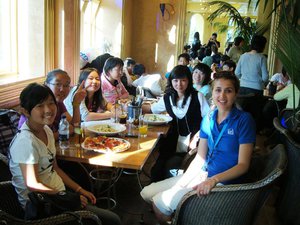 |
| free study abroad guide |
"The summer study abroad camp boosted her academic performance, but most importantly, it exposed her to a different culture and opened a door for her to a broader world," Zhang says. The experience also helped Jingjing psychologically prepare to lead a life among foreigners, important because her parents hope Jingjing will go abroad to study after graduating from high school, Zhang adds. She was so pleased with the effect of the camp that in 2013, Zhang paid almost the same amount of money for Jingjing to enjoy a similar camp program in the English city of Cambridge.
Many Chinese parents are enthusiastic about enrolling their children in such costly but view-broadening programs. "The demand for overseas summer camps from Chinese families is huge and is increasing exponentially," says Louisa Tao, a market manager with EF Education First, a company that works on cultural exchange and study abroad programs.
Since entering the Chinese market in 1993, the Switzerland-based EF Education First has organized overseas study abroad trips and summer camps for about 100,000 Chinese students, Tao says. The dynamics behind the growing popularity of such service is complicated, but the main driving force, Tao believes, is that parents are willing to pay more so their children can gain overseas experience, especially when more and more Chinese prefer foreign universities to domestic ones.
Such parents are likely to be aged 35 to 40 and well educated; some have overseas work or education experience. While they expect a lot from the academic portion of overseas summer camps, the cultural experience is at least as important—maybe more, Tao adds. Wu Jiang, a mother of two girls in Shanghai, recently started a business in organizing study abroad trips for Chinese children.
The inspiration came from her own experience. She and her husband are world travelers, and even though their daughters are now only 2 and 6 years old, they have taken the girls to dozens of countries. In Wu's eyes, nothing is more educational than exposing the children to cultures and lifestyles of different people—to help them understand the world better. "Only in such ways, will they grow into knowledgeable, tolerant, loving and confident people who know enjoying life is far better than pursuing money or worldly benefits," Wu says.
Wu is an active member of an alumni association of several top MBA schools in China, and several years ago she set up an operations team for the association. The team has now launched overseas summer camp programs for the association members' children, and quickly booked all openings.
For Fuzhou resident Wang Hongwei in Fujian province, summer camp means more than cultural experiences. Her daughter, Wenwen, 17, went to a summer camp in London last July. The camp had about 20 Chinese students, all between ages 14 and 18. Together with children from other countries, they lived with different host families.
Apart from learning English and practicing together on weekdays, they visited famous universities, museums, churches and other place of interest during weekends. Wang says that Wenwen has become very independent since returning from the trip. Considering that Wenwen was their little baby girl, Wang and her husband used to take care of everything for her. But the trip took Wenwen into a completely strange environment, where she knew no one, and she had to take buses to school, do the laundry by herself, and maintain good relations with fellow travelers, Wang says.
"She told me she is surprised by the perfect preservation of ancient buildings in London, while I was surprised by her change," Wang says. "The trip enlightened her, and she has become mature. She now cares about what she will do with her future."
For the 15-day study abroad camp, Wang paid about 30,000 yuan, and she thinks it was worth the price.
As long as the summer study abroad camp is educational.
No comments:
Post a Comment